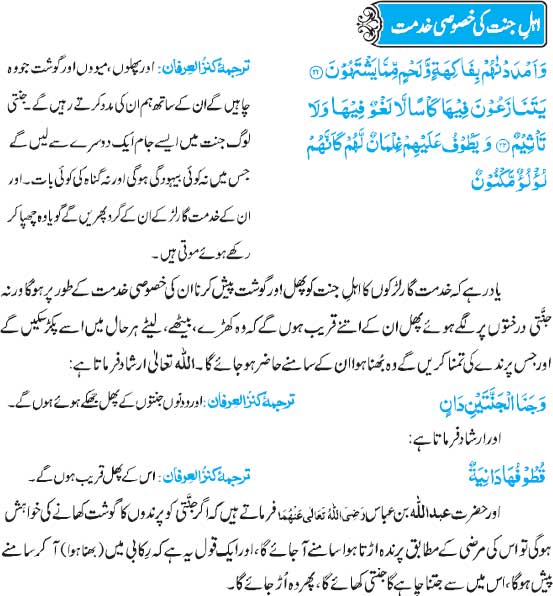
Ahle Jannat Ki Khidmat
Virtues Of Umrah Performed In Ramadan
Ibn ‘Abbas may Allah be pleased with him narrated, “When the Prophet sallallaahu alayhi wa sallam ( may Allah exalt his mention) returned after performing Hajj (major pilgrimage), he asked Umm Sinaan Al-Ansaariyyah, ‘Why did you not perform Hajj?’ She replied, ‘The father of so-and-so [i.e., her husband] had two camels and he went on pilgrimage on one of them, and the second is used for the irrigation of our land.’ The Prophet sallallaahu alayhi wa sallam ( may Allah exalt his mention)said [to her]: ‘An ‘Umrah (minor pilgrimage) in Ramadan is akin to Hajj with me [in terms of reward].’” [Al-Bukhaari and Muslim] According to another narration, he told her: “When Ramadan comes, do ‘Umrah as [the reward for] it then is equivalent to Hajj.”
Likewise, it was reported by Umm Ma‘qil may Allah be pleased with her that the Prophet, sallallaahu alayhi wa sallam (may Allah exalt his mention ), said to her, “Perform ‘Umrah in Ramadan, as it is equal to Hajj.”[Abu Daawood] Similar Hadeeths were also narrated on the authority of Jaabir, Anas, Abu Hurayrah, and Wahb ibn Khanbash may Allah be pleased with them all.
Ibn Battaal may Allah have mercy upon him commented on the aforementioned Hadeeths, saying: The sentence that ‘Umrah “then is equivalent to Hajj”, proves that the Prophet, sallallaahu alayhi wa sallam (may Allah exalt his mention), was actually encouraging her to perform a voluntary Hajj, as the whole Ummah (Muslim nation) has unanimously agreed that the ‘Umrah can never be a substitute for the obligatory Hajj. Moreover, what he, sallallaahu alayhi wa sallam (may Allah exalt his mention), meant is that they are like each other in reward, but virtues cannot truly be perceived through analogy, and Allah The Almighty bestows His Bounty upon whom He Wills.
Benefits and rulings [derived from these Hadeeths]:
1- The mercy and bounty bestowed by Allah The Almighty upon His slaves are great, as He granted them huge rewards in return for small good deeds; so, we praise Him abundantly for that.
2- The Prophet, sallallaahu alayhi wa sallam (may Allah exalt his mention), was keen on ensuring the welfare of his Ummah and would ask after those under his rule. Just as he was the sincerest confidant to all people, any slave whom Allah The Almighty puts in charge of subjects should treat them leniently, advise them, check on their conditions, and serve their worldly and religious benefits.
3- ‘Umrah done during the month of Ramadan cannot be a substitute for the obligatory Hajj, i.e., they are equal in reward, but the former does not replace the latter as a fulfillment of the obligation that is unanimously agreed upon by the scholars.
4- The reward of good deeds increases in proportion to the virtue of the time they are performed, as well as one’s heartfelt devotion and dedication.
5- This Hadeeth is similar to the narration that says, “The Chapter Al-Ikhlaas (Purification) equals one-third of the Quran”; it indicates that it is equivalent in terms of the reward of recitation, not that reciting it could, or should, substitute actually reciting [that much or] the whole of the Quran.
6- The ‘Umrah here is considered equal to the Hajj in reward when it is performed during the month of Ramadan, which is a great season for good deeds. Hence, whoever performs it then, enjoys the virtue of the place [i.e., the Sacred Mosque in Makkah] and time [i.e., Ramadan]; this is also the case with one who performs Hajj, as he is also in the same holy place and in a blessed time [i.e., months of Hajj].
In addition, doing ‘Umrah in the month of Ramadan is more difficult. That is because one may be fasting while performing it or break his fast due to the traveling involved, and then have to make up for it. This is not the case when one performs ‘Umrah during any other month. The Prophet, sallallaahu alayhi wa sallam (may Allah exalt his mention), said to ‘Aa‘ishah may Allah be pleased with her once, when he ordered her to perform ‘Umrah, “It [i.e., its reward] is according to your effort”, or, as per another narration, “according to your expenditure.”[Muslim]
7- This great reward is granted to whoever performs the ‘Umrah during the month of Ramadan, even if he [or she] returns immediately thereafter and does not prolong his [or her] stay in Makkah.
8- These Hadeeths do not mean that it is recommended for one to perform ‘Umrah many times in the month of Ramadan or in a single day of it. This practice, which has become common today, differs from the Sunnah and traditions of the honorable Companions may Allah be pleased with them as it was not reported that any of them used to perform many ‘Umrahs during the same journey to Makkah.
9- Whoever performs ‘Umrah in Ramadan and intends to stay at the Holy Mosque during the whole month or its last ten nights, should guard himself against committing any prohibition, because evil deeds are more sacrilegious in Makkah than in any other place, not to mention, during the month of Ramadan.
10- Whoever takes his family to stay at the Holy Mosque during the month of Ramadan, should take care that they, too, do not fall into committing any forbidden act; otherwise, he may return with sins that exceed the reward he came to earn, due to his negligence towards his wife and children.
11- If one entered the state of Ihraam (ritual consecration) with the intention of performing ‘Umrah and reached Makkah while fasting, he has the choice of either breaking his fast to be able to do it immediately or waiting to do it until after sunset.
Wata Sata Aur Jaheez Ki Sharai Haisiyat

Wata Sata Aur Jaheez Ki Sharai Haisiyat by Mufti Muneeb ur Rehman
April Fool: A Dishonest Tradition
1st April – a day when people lie, play jokes, and mock in the name of entertainment. This ugly practice of lying, which is considered to be merely humor, is known to have caused great harm to many. Even trauma and death. Still, this dishonest tradition is not only practiced among the common masses but also newspapers and magazines participate in it by publishing false news and untrue stories on the first day of April!
Much is said about the origin of this practice, however, what concerns the most the Muslims is that it is a tradition that directly contradicts the teachings and morals of Islam.
Lying is a characteristic of hypocrisy and Allah’s Messenger (sallallahu alaihi wa-sallam) strictly forbade lying at all times. He (sallallahu alaihi wa-sallam) said: “Let he who truly believes in Allah and the Last Day speak good or be silent.” [Saheeh al-Bukharee] Moreover, he (sallallahu alaihi wa-sallam) has specifically cursed the person who lies to make people laugh, he said: “Woe be on one who speaks and lies in order to make people laugh, woe be on him.” [Abu Dawood]
The above Ahaadeeth shows the gravity of participating in the false tradition of the April Fool, which the Western tradition appreciates and encourages claiming that it brings joy and amusement, whereas the Prophet (sallallahu alaihi wa-sallam) forbade lying and deceiving even if the intention of the person is to amuse people.
Abd al-Rahman Ibn Abi Laylaa said: “The companions of the Messenger of Allah (sallallahu alaihi wa-sallam) told us that they were traveling with the Messenger of Allah (sallallahu alaihi wa-sallam). A man among them fell asleep and some of them went and took his arrows. When the man woke up, he got alarmed (because his arrows were missing) and the people laughed. The Prophet (sallallahu alaihi wa-sallam) said: “What are you laughing at?” They said, “Nothing, except that we took the arrows and he got alarmed.” The Messenger of Allah (sallallahu alaihi wa-sallam) said: “It is not permissible for a Muslim to frighten another Muslim.” [Abu Dawood (5004) and Musnad Ahmad.]
He (sallallahu alaihi wa-sallam) described the severe punishments for the liars and said: “I saw (in a dream), two men came to me. They said,’The person, the one whose cheek you saw being torn away (from the mouth to the ear) was a liar and used to tell lies and the people would report those lies on his authority till they spread all over the world. So he will be punished like that till the Day of Resurrection.'” [Saheeh al-Bukharee (vol. 8, no: 118)]
May Allah protect us from indulging ourselves in such dishonest activities and may He give us the strength to withstand such practices when they tend to infect our Muslim Society. Ameen!
Hadith Qudsi: Roza Allah Kay Liye Hai Aur Allah He Ajar Day Ga

Hadith Qudsi: Roza Allah Kay Liye Hai Aur Allah He Ajar Day Ga
5 Things About Iftar
During the holy month of Ramadan, Muslims break their day-long fast at sunset with an evening meal called Iftar. This meal is one of the religious observances of Ramadan and is often done as a community, with people gathering to break their fast together. Iftar is done right at Maghrib (sunset) time. Here are some facts about Iftar traditions across the world:
- Iftar usually starts with consuming a date and drinking water, a tradition that goes back to Prophet Muhammad (PBUH). People can then eat any number of foods, with many regions having their own traditional Iftar foods. It is common for people to eat Iftar in large groups, making the fast break into a community party, and Muslims often try to include a charity in their Iftar meal as well, feeding needy members of the community while they celebrate Iftar.
- In the Middle East, traditional local cuisine figure extensively in Iftars. Dishes include hummus, fattoush, moutabel, stuffed vine leaves, falafel, shawarmas, the filo pastry sweet baklava, and heavier meat dishes like mandi and lamb koftas. The Iftar is usually done at home in most countries with the family, but many people also break their fast in mosques or send food items as charity to their local mosque.
- In Pakistan, Iftar is usually heavy, consisting mainly of sweet and savory treats besides the staple dates and water. Amongst the Punjabi and Mohajir ethnic groups, Iftar is often, but not necessarily, followed up by a regular dinner later during the night, while people from the north of the country combine dinner and Iftar. In Bangladesh, common Iftar items hail from local cuisine and include traditional Bengali sweets as well as different types of fruits. In India, in places like Hyderabad, people break their fast with a dish called haleem because it has a rich taste and is quite filling. In Southern states such as Tamil Nadu and Kerala, Muslims break their fast with nonbu kanji, a rich, filling rice dish of porridge consistency, cooked for hours with meat and vegetables.
- In Egypt, most families break the fast with a dish made from foul medames eaten with brown bread. Another Ramadan specialty is the crescent-shaped bread or khaboos Ramadan. In Iran, people have some sweet tea and Tabreezi cheese, and walnut sandwiches after the call to prayer. In Indonesia, Iftar is called “buka puasa” which means “to open the fast”. Most Iftar food items are only found easily in Ramadan.
- Iftars are important community events in western, non-muslim countries. In the US, for instance, Iftar meals are often held at mosques, and Islamic communities, to which Muslim families are invited. The United States Department of State holds an annual Iftar dinner for community leaders from US society and faith groups as well as foreign policy officials. The first President to attend an Iftar was Thomas Jefferson.
Taraweeh Kay Fazail Aur Masail
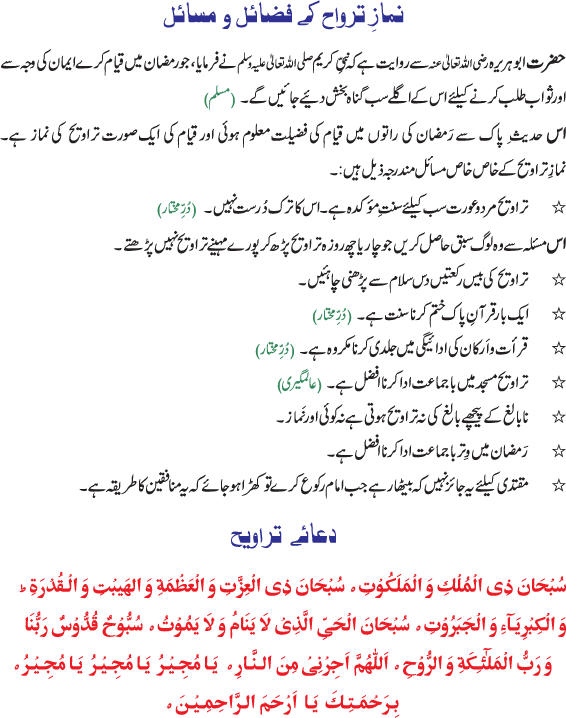
Taraweeh Kay Fazail Aur Masail
Fasting Is Prescribed For You
[2. Surah Al-Baqarah: Ayah 183] O you who believe! fasting is prescribed for you, as it was prescribed for those before you, so that you may guard (against evil).
[2. Surah Al-Baqarah: Ayah 184] For a certain number of days; but whoever among you is sick or on a journey, then (he shall fast) a (like) number of other days; and those who are not able to do it may effect a redemption by feeding a poor man; so whoever does good spontaneously it is better for him; and that you fast is better for you if you know.
[2. Surah Al-Baqarah: Ayah 185] Whoever of you is present in the month, he shall fast therein, and whoever is sick or upon a journey, then (he shall fast) a (like) number of other days; Allah desires ease for you, and He does not desire for you difficulty, and (He desires) that you should complete the number and that you should exalt the greatness of Allah for His having guided you and that you may give thanks.
[2. Surah Al-Baqarah: Ayah 186] And when My servants ask you concerning Me, then surely I am very near; I answer the prayer of the suppliant when he calls on Me, so they should answer My call and believe in Me that they may walk in the right way.
[2. Surah Al-Baqarah: Ayah 43] And keep up prayer and pay the poor-rate and bow down with those who bow down
Our Lord! grant us good in this world and good in the hereafter, and save us from the chastisement of the fire.
Roza Na Rakhne Kay Masail
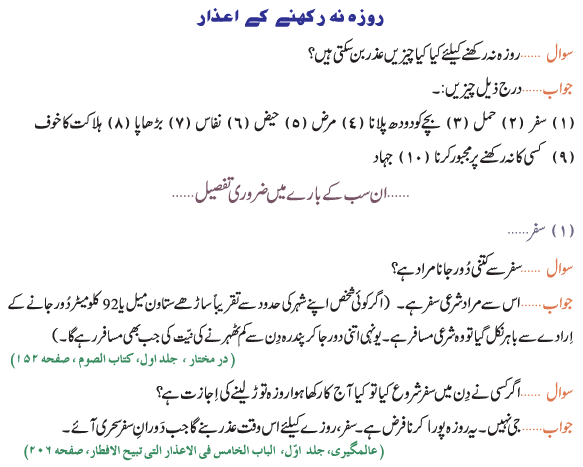
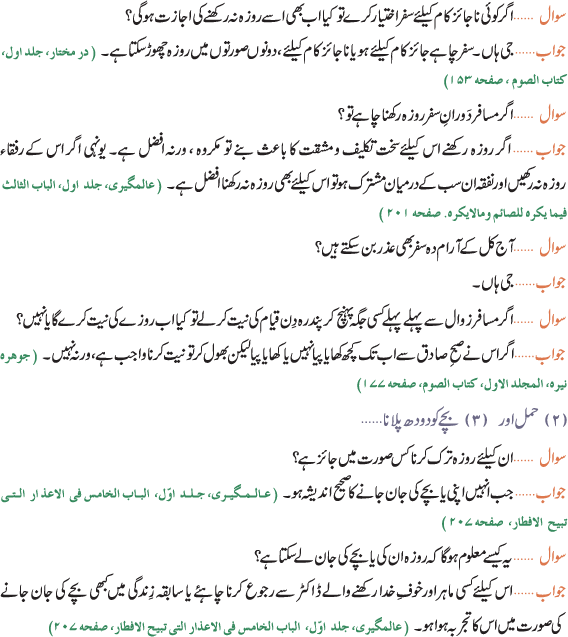
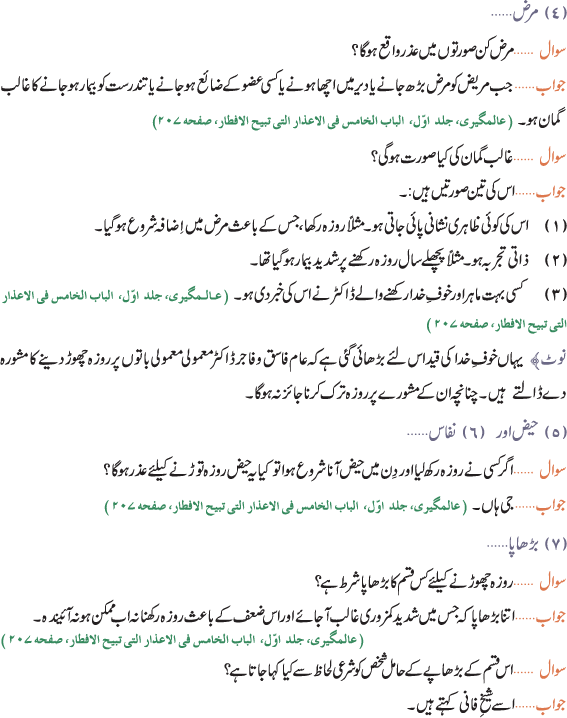
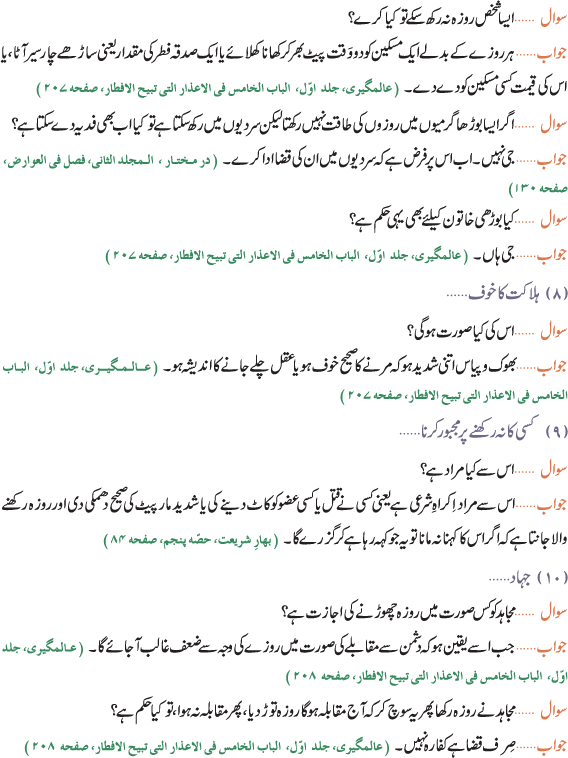
Roza Na Rakhne Kay Masail (Safar, Hamal, Bachay Ko Doodh Pilana, Marz, Haiz, Nifaas, Burhapa, Khof, Jihad)
Jonah And The Whale
In the name of God, the Lord of Grace, the Ever Merciful Jonah too was one of Our messengers. He deserted, going on the laden ship. They cast lots, and he was the one who lost. The whale swallowed him, for he was to blame. Had he not been of those who truly glorified God, he would have remained in the whale’s belly till Resurrection Day. We caused him to be cast out, sick, on a barren shore and caused a gourd tree to grow over him. Then We sent him to (a community of) one hundred thousand or more, They believed, so We let them enjoy life for a while. (Ranged in Rank, Al-Saffat: 37: 139-148)
After giving us the powerful scene of the sacrifice Abraham and Ishmael were required to give, in fulfillment of God’s command, the surah gave us a few glimpses of some of Abraham’s descendants including Isaac, Moses, Aaron, and Elijah, then added a glimpse of Lot and the fate of his people. The last of these glimpses from the history of earlier messengers is the one we are looking at today. It concerns Jonah and what happened to him.
The Qur’an does not mention where Jonah’s people lived, but it is understood that they were not far from the sea. Reports tell us that Jonah was frustrated by his people’s continued denial of his message and the truth it made clear. He warned them against God’s impending punishment and then abandoned them in anger. His anger led him to the seashore, where he boarded a laden ship.
When the ship was in the middle of the sea, it was hit by a raging storm. It was widely believed at that time that such a disaster signaled that among the passengers there must be someone who had incurred God’s anger. For the ship to withstand the storm that person had to be thrown overboard.
They, thus, drew lots and Jonah was the one who lost. Although they knew him to be a virtuous and God-fearing man, the drawing of his lot was confirmed. Therefore, they threw him into the sea, or he might have jumped himself.
Nonetheless, he was swallowed by the whale, deserving of blame, because he had abandoned the assignment God had given him, leaving his people in anger before seeking God’s permission.
When he felt acute distress inside the whale’s belly, he glorified God and prayed for His forgiveness, stating that he had wronged himself. He said in his prayer: “There is no deity other than You! Limitless are You in Your glory! I have done wrong indeed!” God answered his prayer, and the whale cast him out.
The surah makes it clear that “had he not been of those who truly glorified God, he would have remained in the whale’s belly till Resurrection Day.” When he was cast out, he was both sick and naked. Therefore God “caused a gourd tree to grow over him,” its broad leaves covering him. It also protected him against flies, which are said not to come near this plant. This was part of the favor God bestowed on him. When he had recovered, God returned him to the people whom he had left in anger. In turn, they feared that his warnings would come true, and they believed, praying for God’s forgiveness. God thus accepted them, sparing them the punishment He inflicts on people who deny His message: “They believed, so We let them enjoy life for a while.” They numbered a hundred thousand or more, and all of them became believers.
This brief account of Jonah’s story explains the fate of those who believe, so contrasting the fate of the unbelievers in the other stories. Let the Arabs, who received the message of Muhammad (peace be upon him), choose which fate they prefer.
After this comes the last part in which the surah builds on the main themes already discussed, particularly the historical accounts given in the second part which explain the true nature of the relation between God and His servants to refute the superstitions circulated among the Arabs. In one such superstition, the Arabs claimed that the angels were God’s daughters, and in another, they alleged that a marriage relation existed between God and the jinn. The surah now puts before them what they said before God’s message was delivered to them.
This was when they expressed dear hopes that God would send them a messenger and when they emphasized that they would follow the guidance such a messenger provided. Yet when God sent them the Messenger they asked for they resorted to disbelief. The surah concludes by stating God’s promise to His messengers that they will end victorious, disassociating God from all the unbelievers’ claims, and praising God, the Lord of all the worlds.
– Commentary by Sayyid Qutb

